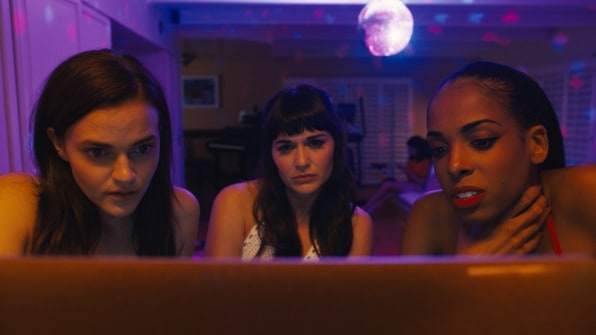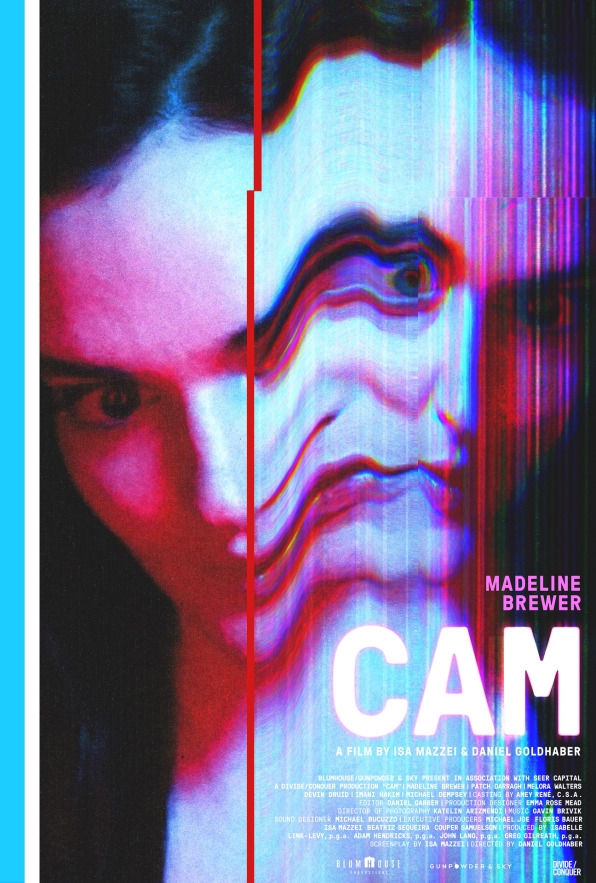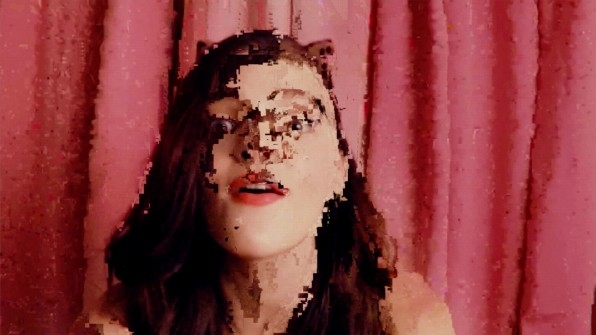It’s a time-honored tradition in teen slasher movies that girls who have sex die first. Sneak off to a horny corner of that cabin in the woods and you most likely will not be right back.
The post-coital kill trope in horror movies represents a broader real-world social directive: to reward women for chastity and eviscerate them for sexual liberation. This virgin-prizing mindset predates horror movies, but it keeps seeping into the collective unconscious partly through them–and also through the way most media treats female sex workers.
These apparently virtue-free souls often show up on your TV as expendable parcels of human capital, fleshy props for revealing that a killer is on the loose, but–don’t worry!–he’s not going after good people. Considering how horror movies help perpetuate puritanical ideas about sex, it’s poetic justice that a horror movie itself would completely flip the script on how sex workers are depicted.
Now streaming on Netflix, Cam is an unsettling film set in the world of cam performers–where women film themselves undressing, masturbating, or performing specific fetish tasks at the whim of their customers, who then digitally tip them. Despite the salacious subject matter, it’s a movie that’s bound to tingle spines more than any other part of the anatomy.
The Blumhouse-produced creepfest follows Lola (The Handmaid’s Tale’s Madeline Brewer), a rising star on FreeGirls.Live, whose world begins to unravel when she finds a digital doppelgänger doing her job, under her name, more successfully than she does. What happens from there is a mind-bending meditation on digital identity, compelling enough to earn a rave review from Stephen King.
Loved CAM, on Netflix. Great lead performance by Madeline Brewer.
— Stephen King (@StephenKing) November 20, 2018
Cam is a vivid peephole-glimpse into the world of cam performers, coming from an honest and personal place. If it seems to exist in a different universe than the likes of Pretty Woman and The Girl Next Door–one that more closely resembles Planet Earth–it might because Isa Mazzei, who wrote it, is herself a former sex worker.

[Photo: courtesy of Caitlin Fullam]
“The whole impetus was to tell a story where the audience would identify with someone who does what I used to do,” she says. “Before we even knew it would be a genre film, we knew we wanted to make a movie that viewed sex workers in a sympathetic light and de-stigmatized sex work.”
The other half of that “we” is director Daniel Goldhaber, a longtime friend (and former paramour) who first worked with Mazzei when she hired him to record videos for her to sell. Over the course of that initial collaboration, Goldhaber became entranced by the camming world. He convinced Mazzei to work with him on a feature film set in this space.
Although she had never published any material before, Mazzei had long been a writer of self-described “emo poetry and bad novels.” She was drawn to the idea of channeling her cam experience into a movie–especially if she could make one that showed the world that sex work is just another job, where sometimes one performer stands on the sidelines holding up delivery menus so another performer can surreptitiously choose, mid-filming, which she prefers for dinner. Maybe she could even show viewers that this job was a really difficult job; that it didn’t just involve mechanically removing one’s clothes for bundles of cash.

Mazzei and Goldhaber played with the idea of making their film a documentary and dismissed it, settling on telling a fictional story. Before arriving at the idea of Lola and her doppelgänger, though, the creators wrote a manifesto to guide their broader vision for the project.
“We decided that the negative stakes of the film could never be derived from the protagonist’s decision to engage in sex work,” Mazzei says. “There was also this constant balancing act of making something people would want to watch regardless of the politics, but that forcefully conveyed a political message at the same time.”

Part of the doppelgänger story she and Goldhaber landed on came from a specific aspect of Mazzei’s experience as a cam performer: piracy. Enterprising scavengers would capture her private performances and plaster images from them all over websites like Pornhub. Videos would appear online, digitally scrubbed of their creator’s watermark and any attribution, with titles like “Tall, frizzy-haired girl.” Mazzei would then watch them and see a version of herself that felt like a knockoff bootleg. It was the kind of identity theft authorities are less concerned with than bank fraud, but it took a toll on both her bottom line and her mental well-being.
“I felt alienated from my own image,” Mazzei says. “And so grappling with that feeling of violation and that feeling of alienation from self is where Lola came from. Her doppelgänger is a literal manifestation of how I felt watching myself on the internet doing something that was in no way linked back to me anymore and where people didn’t know it was me.”
What feels revolutionary about Cam is how relatable it is. Lola’s desire to succeed as a cam performer is never judged. Instead, it’s presented as a typical hero’s journey, albeit one set in an esoteric field. Much like the protagonists in Black Swan and Whiplash, whose screenplays served as touchstones for Mazzei, Lola wants to be the best at what she does. The movie never questions her motivations for that desire; they’re merely assumed. (Just like those of the drummer in Whiplash and the ballerina in Black Swan.) Cam could just as easily be about any other kind of online performer, whether it’s a Twitch streamer or a YouTuber or an Instagram influencer.

[Photo: courtesy of Katelin Arizmendi]
And you don’t have to make a living on the internet to relate to Lola’s fractured identity. In one way or another, nearly everybody is an online performer now.
“Any form of digital expression is a performance because it’s curated,” Mazzei says. “Even if you’re trying to be really real online, you’re still deciding what to post and what not to post, therefore it’s never going to be a real picture.”
Social media has warped our understanding and presentation of self. We contort ourselves into whatever version of us the crowd responds to most. We thrive on likes and retweets, and carve out online personas based on whatever delivers them.
Cam is a film that explores the anxieties around the negative space where we end and those online personas begin.
If the scene where Lola celebrates finally making it into the top 50 cam performers on FreeGirls.Live by joyfully dumping a bucket of confetti on herself doesn’t feel both endearing and familiar, you either have no heart or no social media presence. (If it’s the latter: my sincere congratulations.)
Since completing her work on Cam, Mazzei has secured a book deal–her cam performer memoir is due in November 2019–and started work with Goldhaber on another thriller from Blumhouse. If the version of Mazzei depicted in that memoir could see her current incarnation, she might not recognize herself. They’re both clearly the same person, though.
(43)